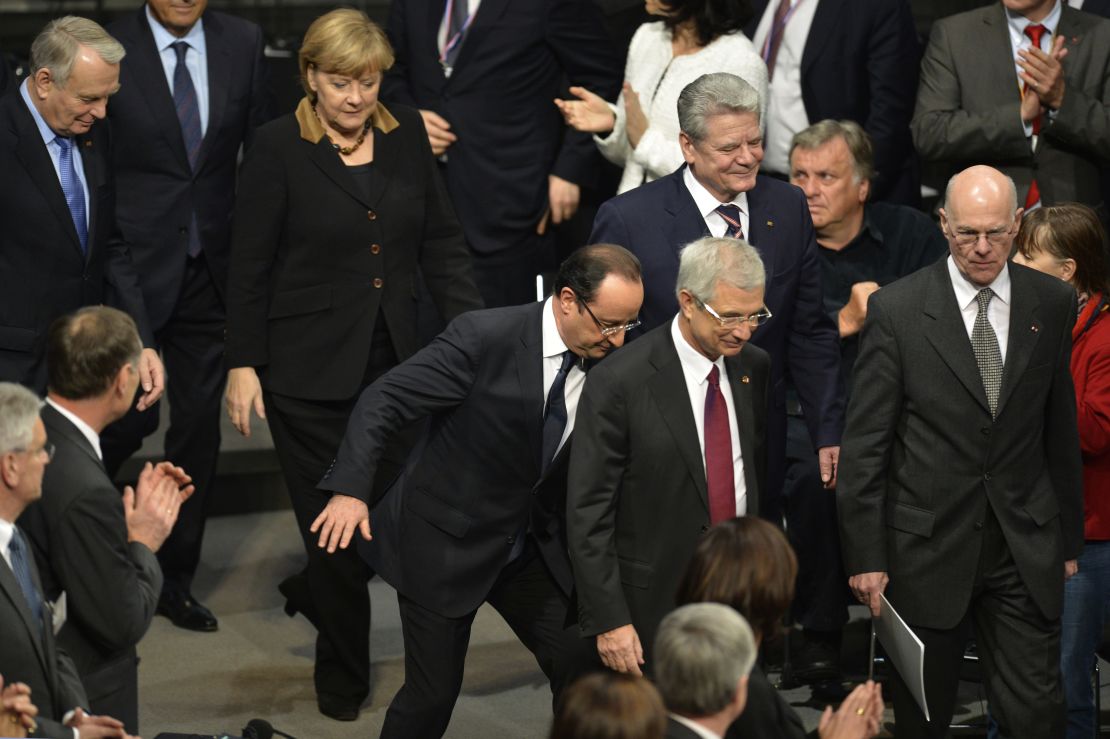Editor’s Note: Agnes Poirier is a French journalist and political analyst who contributes regularly to newspapers, magazines and TV in the UK, U.S., France, Italy. Follow @AgnesCPoirier on Twitter.
Story highlights
It is 50 years since the leaders of France and Germany signed the Elysée Treaty
French and German politicians gathered in Berlin Monday to celebrate the anniversary
Agnes Poirier describes France and Germany as the European Union's locomotive
Europe's future depends on their unity of purpose and action, Poirier says
France and Germany have just celebrated the 50th anniversary of the Elysée Treaty in Berlin. Even British Prime Minister David Cameron had to respect this most symbolic date and wait another 24 hours before delivering his long-awaited speech on Europe.
In 2003, for the Elysée Treaty’s 40th anniversary, Jacques Chirac had lavishly received Chancellor Gerhard Schröder, and the whole of the Bundestag to Versailles. In his speech, the French president had invoked Goethe, Hugo and of course Charles de Gaulle and Adenauer, the founders of the Franco-German rapprochement in 1963.

This year, Berlin was hosting the celebrations with a Bundestag bursting at the seams, having had to add 577 extra seats to accommodate the whole of the French National Assembly. German Chancellor Angela Merkel and French President François Hollande gave a common press conference, met with students, answered their questions and went for lunch.
Some in the press corps, like Ian Traynor, The Guardian’s Brussels correspondent, complained about the food and tweeted a picture of the menu: beetroot, red cabbage and red berries, prompting the all too predictable comment: “why didn’t they let the French do the cooking?”
Opinion: Why Hollande must show clearer leadership
There was pomp, emotion and comedy. As Hollande made its way into a packed Reichstag for his speech, he missed a step. A broken leg would have sent the wrong message. Luckily, the president didn’t fall. A few moments later, when the first notes of the Marseillaise started filling the Reichstag for the first time in the building’s dramatic history, even French MPs held their breath and eyes got misty.

For the Elysée Treaty has no comparison in contemporary history: it still, to this day, offers a unique model of reconciliation between two states. France and Germany enjoy joint cabinet meetings and political partnerships at all levels. Both countries have gone from hereditary hatred, to hereditary friendship. And this is no small accomplishment in light of the three wars France and Germany waged against each other from 1870 to 1945.
As Thomas Klau from think-tank ECFR (European Council of Foreign relations) put it: “The Elysée Treaty is to France and Germany what the Bible is to the church, even if people don’t read it every day.”
With a combined total of 40% of the eurozone GDP, 33% of the entire EU’s population and 31% of its budget, France and Germany are the locomotive of the European Union and remain so even when their respective heads of state are at odds.
It always takes a French president and a German chancellor a couple of years to get along well. Mitterrand-Kohl, Chirac-Schröder, Sarkozy-Merkel, even when they both belonged to the same political family, took time to work together. But when there is a spark and personal chemistry between the two leaders, this means progress for the whole continent.
During intermediary phases when they are getting to know each other – like today, with a social democrat Hollande and a conservative Merkel – progress is slow. Nowhere better than in Brussels is this more obvious. And it is especially damaging in time of a crisis such as the one we’re living.
This is why France and Germany have no choice but to find a compromise or there could be consequences for the European project. France thinks financial solidarity should precede political integration, Germany suggest the opposite. No doubt the markets and their 25 European partners in the union will soon remind them to come up with a common view.
At this time more than ever – in the week that Cameron has promised Britain a referendum on its EU membership – Europe’s future depends on Franco-German unity of purpose and action.
The opinions expressed in this commentary are solely those of Agnes Poirier.
